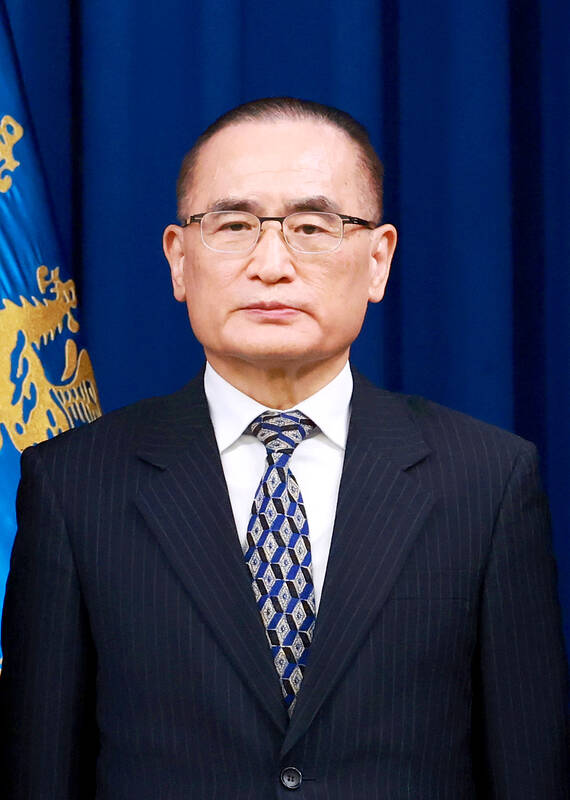South Korea is in talks with the US about raising its defense spending, a key demand of US President Donald Trump as he calls on allies to ramp up their outlays on security and lessen the burden on the US.
“Such discussions are ongoing between working-level officials. We need to decide how to respond,” South Korean National Security Adviser Wi Sung-lac told reporters late Thursday, indicating that progress in talks on trade would also support discussions on security. “It is true the US is currently making similar requests to several allies, similar to NATO.”
NATO leaders this week agreed to increase defense spending to 5 percent of GDP and renewed their commitment to mutual defense in a major win for Trump.

Photo: EPA-EFE
The discussions come as the administration of South Korean President Lee Jae-myung engages with the US over issues including key trade negotiations after months of domestic political instability.
Wi did not clarify if Seoul has been specifically asked by the US to target 5 percent of GDP, although US officials have been hinting that partners in Asia also need to raise spending toward that level.
“If our allies in Europe and our NATO allies can do it, I think our allies and our friends in the Asia-Pacific region can do it as well,” White House Press Secretary Karoline Leavitt said on Thursday.
The new NATO spending target breaks down into 3.5 percent for core defense spending and an additional 1.5 percent in related investment, including infrastructure and cybersecurity. Whether all member states eventually reach the spending goals agreed to on Wednesday remains an open question.
“South Korea is one of the countries with the highest defense budget to GDP ratio among major US allies, and has been continuously increasing our defense budget in consideration of the serious security situation, including North Korea’s nuclear and missile threats,” the South Korean Ministry of Defense said in a statement yesterday.
South Korea hosts 28,500 US troops to help deter the threats of North Korea.
Seoul plans to spend 2.32 percent of GDP on defense this year, according to the defense ministry.
Wi met with US Secretary of State Marco Rubio on the sidelines of the NATO summit in Brussels to lay the groundwork for a possible summit between Trump and Lee.
“Although no specific date has been set, there is consensus on the need to move forward quickly. This can be considered a positive outcome,” Wi said.

FREEDOM OF NAVIGATION: The UK would continue to reinforce ties with Taiwan ‘in a wide range of areas’ as a part of a ‘strong unofficial relationship,’ a paper said The UK plans to conduct more freedom of navigation operations in the Taiwan Strait and the South China Sea, British Secretary of State for Foreign, Commonwealth and Development Affairs David Lammy told the British House of Commons on Tuesday. British Member of Parliament Desmond Swayne said that the Royal Navy’s HMS Spey had passed through the Taiwan Strait “in pursuit of vital international freedom of navigation in the South China Sea.” Swayne asked Lammy whether he agreed that it was “proper and lawful” to do so, and if the UK would continue to carry out similar operations. Lammy replied “yes” to both questions. The

‘OF COURSE A COUNTRY’: The president outlined that Taiwan has all the necessary features of a nation, including citizens, land, government and sovereignty President William Lai (賴清德) discussed the meaning of “nation” during a speech in New Taipei City last night, emphasizing that Taiwan is a country as he condemned China’s misinterpretation of UN Resolution 2758. The speech was the first in a series of 10 that Lai is scheduled to give across Taiwan. It is the responsibility of Taiwanese citizens to stand united to defend their national sovereignty, democracy, liberty, way of life and the future of the next generation, Lai said. This is the most important legacy the people of this era could pass on to future generations, he said. Lai went on to discuss

AMENDMENT: Climate change is expected to increase the frequency of high-temperature days, affecting economic productivity and public health, experts said The Central Weather Administration (CWA) is considering amending the Meteorological Act (氣象法) to classify “high temperatures” as “hazardous weather,” providing a legal basis for work or school closures due to extreme heat. CWA Administrator Lu Kuo-chen (呂國臣) yesterday said the agency plans to submit the proposed amendments to the Executive Yuan for review in the fourth quarter this year. The CWA has been monitoring high-temperature trends for an extended period, and the agency contributes scientific data to the recently established High Temperature Response Alliance led by the Ministry of Environment, Lu said. The data include temperature, humidity, radiation intensity and ambient wind,

SECOND SPEECH: All political parties should work together to defend democracy, protect Taiwan and resist the CCP, despite their differences, the president said President William Lai (賴清德) yesterday discussed how pro-Taiwan and pro-Republic of China (ROC) groups can agree to maintain solidarity on the issue of protecting Taiwan and resisting the Chinese Communist Party (CCP). The talk, delivered last night at Taoyuan’s Hakka Youth Association, was the second in a series of 10 that Lai is scheduled to give across Taiwan. Citing Taiwanese democracy pioneer Chiang Wei-shui’s (蔣渭水) slogan that solidarity brings strength, Lai said it was a call for political parties to find consensus amid disagreements on behalf of bettering the nation. All political parties should work together to defend democracy, protect Taiwan and resist